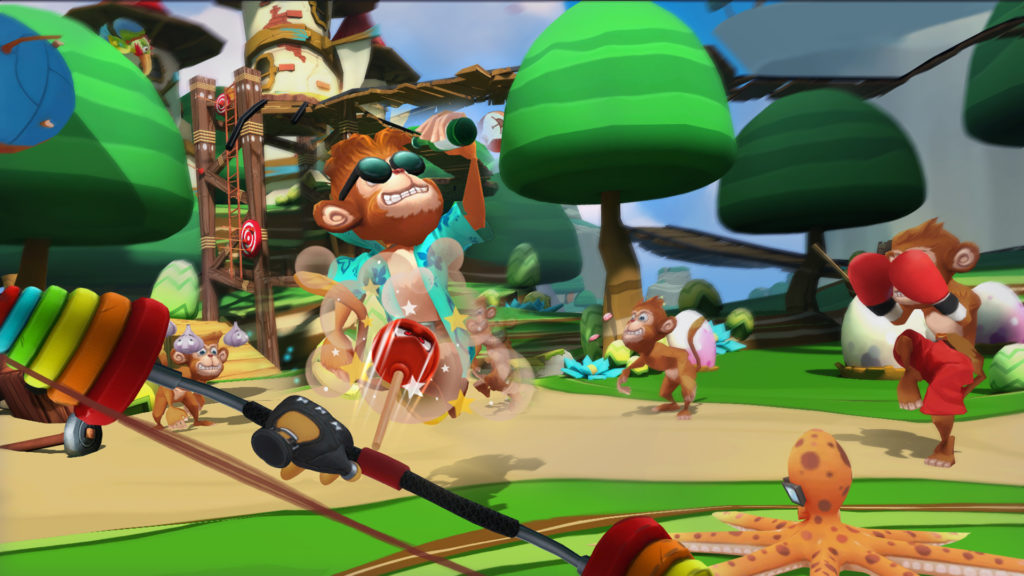Chinese game publisher Oasis Games is making a big commitment to virtual reality. The company, which released its first PlayStation 4 game, Koi, in the US earlier this year, is bringing five PlayStation VR games out in Sony’s launch window. Ace Banana, Weeping Doll, Pixel Gear and Mixip will launch in October, while Dying: Reborn will be available this winter.
The company is connecting with gamers across multiple platforms. Oasis Games has also worked with Tencent and Bandai Namco on the massive PC multiplayer online (MMO) game Naruto Online.
Alen Wu, director of business development at Oasis Games, joined [a]listdaily to explain why the company is investing heavily in PS VR and how its development teams are creating games for the global market in this exclusive interview.
What opportunities is PlayStation VR opening up for your company?
The PlayStation VR is allowing us [Oasis Games] the opportunity to share with the world the exciting developments that are happening in China in console and VR, as well as the creations of extremely talented Chinese developers. Our initial lineup for the PlayStation VR is also expanding our presence in the Western markets and bringing some unique entertaining experiences to gamers there.
Why did you decide to support Sony’s PS VR launch with so many titles out of the gate?
While we have published over 35 games in other territories since 2011, we only began publishing in the West this April with Koi for PlayStation 4. Our PlayStation VR lineup is very diverse and the perfect vehicle to continue to introduce our games to players in the West.
Can you talk about your strategy in selecting different genres and types of games to focus on for PS VR’s launch?
As SIESH’s [Sony Interactive Entertainment Shanghai] current sole strategic partner, we had the rare opportunity to come out of the gate with many titles within the PlayStation VR launch window. While the lineup focuses on two main genres, shooters and horror, we’re able to show what can be done with VR in those genres and just how different those experiences can be, ultimately providing VR experiences for both casual and core gamers. For example, while both are family friendly gallery shooter style games, Ace Banana takes an archery approach with lots of goofy humor while Pixel Gear is fast-paced and has players blasting blocky enemies with rewards for more precision. Our horror games include a first-person room escape experience with Dying: Reborn which will offer three chapters for PS VR and six chapters for PS4 and PS Vita and the story driven Weeping Doll. Unlike Dying: Reborn, Weeping Doll is not free-roaming. You control an avatar and move by selecting a destination, which shifts your perspective. This style of movement also has a side benefit for those sensitive to VR gaming by limiting motion sickness.
Creatively, what is VR opening up for your development studios?
Much like others who are creating VR games, our developers are faced with a world of possibilities, but also the challenges that come with such a different platform where you are creating virtual worlds for an audience that is not familiar with this new experience. Also, as we go we’re forging new development paths for the VR genre. It’s exciting and a bit daunting at the same time.

What did you learn from your first PlayStation 4 game, Koi, that you’re applying to these PS VR games?
With Koi being our first foray into console gaming as well as publishing in the West, we learned the importance of partnering with Sony. Of course, the partnership would not have existed without a strong game, but all of our activations were amplified through the PlayStation Blog or the game store and other areas. There are also key learnings about how to promote a game in terms of marketing and PR that we’ve applied in all of our efforts, including our MMORPG Naruto Online for PC. We also see how equally important community efforts are to the success of a game and have upped our support in those areas.
How are you developing experiences for a global audience?
Our developers, while being Chinese, have very different cultural backgrounds. Additionally, while they did not grow up with many console games like most Western players did, they are all huge fans of gaming and are extremely knowledgeable about Western and Japanese developed games. We feel these two reasons, combined with the great talent pool in China, are key elements for successfully developing games for a global audience.
What are your marketing plans for these titles?
Rather than advertising we are very focused on PR and community-driven initiatives and aligning all of our efforts with Sony across all territories, including North America, Europe and Asia.
How are you working with Sony to cross-market these titles?
While I cannot go into details at this time, similarly to how we worked with Sony on KOI, we are looking at any opportunity to spotlight our games. This can range from inclusion in announcements and PlayStation events to the PlayStation Blog.
While there will be a limited number of PS VRs installed base at launch, do you see VR having a longer shelf life given that a year from now VR is going to be new to someone and they’ll be looking for games?
Absolutely. Gamers will become familiar with the PS VR by playing with their friends who own them. And as long as the games keep progressing, they will see the PS VR as a vital part of their gaming collection. Developing on a VR platform is quite different from other platforms, and there is still much to be discovered and implemented into games going forward.
What opportunities do you see for PS VR connecting with a mainstream audience versus the more expensive PC-based systems like HTC Vive and Oculus Rift?
We see the PlayStation VR as being a leading player in the VR market. As you mentioned, the PS VR is priced competitively while also having the advantage of a massive PS4 install base compared to those who own high-end gaming PCs. We’ve also heard feedback from our recent media tour that the PlayStation VR unit has been the most accessible in terms of usability.
How quickly do you feel PS VR will expand its audience?
We feel expansion will happen quickly in the first year, increasing as developers become more familiar with the platform and more high-quality games are released. There are features such as co-op play that will also encourage gamers to purchase their own PS VR unit so they can join their friends.
What potential do you see for PlayStation VR outside of North America?
Regardless of regions, gamers share an excitement for new ways to play. We feel the interest in the PlayStation VR is and will be universal, especially with games launching closely together across all territories. This is a strategy we look to implement with our PS VR releases as well.

